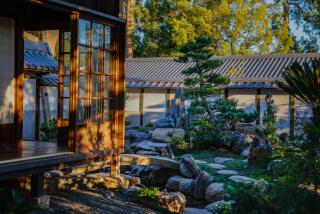Peacekeepers in Cambodia Bring Comforts of Home
TAKEO, Cambodia — Inside a green canvas tent pitched among the rice fields of impoverished southern Cambodia, Maj. Kiyohiko Ohta pulls out his yen debit card to buy a Sapporo beer from home.
The Japanese soldier, serving with U.N. peacekeeping forces, could have bought one from his outfit’s shiny new vending machine, but would need the right change. It was easier to slip a card into the cash register slot and have the price of the beer, about 75 cents, deducted from his commissary credit account.
Ohta belongs to a 600-member Japanese engineering battalion that is building roads. He and his comrades are among the first Japanese soldiers deployed overseas since World War II.
They brought the high-tech, gadget-crazed world of Japan along to their camp, a compound enclosed by barbed-wire in Takeo, 40 miles south of Phnom Penh.
A recreation tent features nightly news, baseball and entertainment videos. Another resembles a Tokyo supermarket, stocked with such reminders of home as miso soup, fish, potato salad and fruit cocktails. A freezer truck holds imported meat.
A steam-bathing tent is filled with vats of hot water. Prefabricated buildings with air-conditioners and a karaoke sound system, are on the way.
“Most soldiers don’t feel homesick,” said Lt. Col. Takashi Watanabe, the battalion commander.
His soldiers are part of a 22,000-member U.N. peacekeeping force from more than 40 countries deployed to help rebuild Cambodia after two decades of war and help prepare it for democratic elections to be held by May.
The Japanese are rebuilding Takeo’s link with the capital, National Route 3. Seventy-five Japanese policemen and eight military observers are helping stem banditry and monitor the fragile cease-fire.
“I never saw up-to-date engineering equipment like this,” said Kong Tuch, 16, who sat in the sun watching the Japanese at work. “I saw such equipment on TV, but I was not sure it existed. I wanted to come and see for myself.”
The sudden arrival of Japanese technology in this small, backward town tempted residents to steal a generator, fuel and other items.
In response, the battalion issued rifles and assigned men to watch duty 24 hours a day.
That was just a scare tactic, however. The soldiers are not allowed to carry ammunition because Japan’s constitution forbids employing force to settle international disputes. Opposition politicians, students and others used the ban to argue against participation in U.N. peacekeeping operations.
To circumvent the debate, Japan’s parliament passed a law allowing service in peacekeeping missions as long as the Japanese soldiers are unarmed and limited to such noncombat roles as construction.
Also, Ohta said, he and the other troopers are forbidden to eat or drink in local establishments or consort with prostitutes, and must be in camp by 9 p.m.
More to Read
Sign up for Essential California
The most important California stories and recommendations in your inbox every morning.
You may occasionally receive promotional content from the Los Angeles Times.










